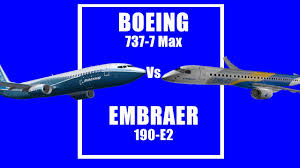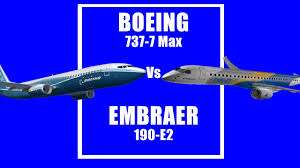
Plans a alliance between Brazil and the United States - from regional jets to jumbos, was left in tatters after the US plane maker Boeing Co pulled out of a $4.2 billion deal to acquire the Embraer’s commercial jets division of Embraer. The decision by Boeing resulted in a furious response from its jilted partner.
The deadline for the deal, which was first brought to light in 2018, passed away with no agreement on how to implement a deal resulting in the collapse of the deal.
Embraer was blamed by Boeing for not meeting the conditions for closing the transaction. IN reply to the accusations, Embraer accused Boeing of unilaterally cancelling the deal because of the wider financial problems that it faces because of the coronavirus crisis as well as the continued grounding of its 737 MAX planes.
“Embraer believes strongly that Boeing has wrongfully terminated the (agreement,)” the Brazilian company said.
A more emollient tone was assumed by Boeing in this regard but it has been reported that preparations for months of argument over the breakup between the two parties is being taken by the companies.
“Over the past several months, we had productive but ultimately unsuccessful negotiations … We all aimed to resolve those by the initial termination date, but it didn’t happen,” Boeing senior vice-president Marc Allen said in a statement.
The global impact of a faceoff between Boeing and European aircraft maker Airbus as both the companies plans to expand into regional jets has also effectively been halted. After purchasing Canadian CSeries in 2018, Airbus renamed it A220 and the aircraft has sold well.
Gaining access to lower-cost engineers and new manufacturing options were the two main areas of interest for Boeing to go into the deal with Embraer, said industry sources. However the US aircraft maker is not planning to reduce its workforce by 10 per cent while also pleading the US government for financial aid for the entire aerospace sector.
This faceoff with the Brazilian company also essentially broke down a previously close relationship between two of the three largest aircraft makers of the world as both the US and Brazilian company have taken on a similar stance on trade battles with Europe and Canada.
“This is not the kind of statement you see very often in this industry,” Teal Group consultant Richard Aboulafia said.
While the deal entails a breakup fee of $100 million, it has been reported that Embraer will be suing Boeing for a far larger amount on damages over allegations that there has been damage to sales of its E2 jets because of the long period of uncertainty. The company said that it will pursue “all remedies” against Boeing but did not elaborate further.
This development in the deal has also effectively broken down an additional deal on commercial aviation which was a separate joint-venture aimed to find new markets for Embraer’s KC-390 military cargo plane. However, it is likely that a more simple agreement to “market and support” the KC-390 will be retained which was signed in 2012.
(Source:www.leaderpost.com)
The deadline for the deal, which was first brought to light in 2018, passed away with no agreement on how to implement a deal resulting in the collapse of the deal.
Embraer was blamed by Boeing for not meeting the conditions for closing the transaction. IN reply to the accusations, Embraer accused Boeing of unilaterally cancelling the deal because of the wider financial problems that it faces because of the coronavirus crisis as well as the continued grounding of its 737 MAX planes.
“Embraer believes strongly that Boeing has wrongfully terminated the (agreement,)” the Brazilian company said.
A more emollient tone was assumed by Boeing in this regard but it has been reported that preparations for months of argument over the breakup between the two parties is being taken by the companies.
“Over the past several months, we had productive but ultimately unsuccessful negotiations … We all aimed to resolve those by the initial termination date, but it didn’t happen,” Boeing senior vice-president Marc Allen said in a statement.
The global impact of a faceoff between Boeing and European aircraft maker Airbus as both the companies plans to expand into regional jets has also effectively been halted. After purchasing Canadian CSeries in 2018, Airbus renamed it A220 and the aircraft has sold well.
Gaining access to lower-cost engineers and new manufacturing options were the two main areas of interest for Boeing to go into the deal with Embraer, said industry sources. However the US aircraft maker is not planning to reduce its workforce by 10 per cent while also pleading the US government for financial aid for the entire aerospace sector.
This faceoff with the Brazilian company also essentially broke down a previously close relationship between two of the three largest aircraft makers of the world as both the US and Brazilian company have taken on a similar stance on trade battles with Europe and Canada.
“This is not the kind of statement you see very often in this industry,” Teal Group consultant Richard Aboulafia said.
While the deal entails a breakup fee of $100 million, it has been reported that Embraer will be suing Boeing for a far larger amount on damages over allegations that there has been damage to sales of its E2 jets because of the long period of uncertainty. The company said that it will pursue “all remedies” against Boeing but did not elaborate further.
This development in the deal has also effectively broken down an additional deal on commercial aviation which was a separate joint-venture aimed to find new markets for Embraer’s KC-390 military cargo plane. However, it is likely that a more simple agreement to “market and support” the KC-390 will be retained which was signed in 2012.
(Source:www.leaderpost.com)














